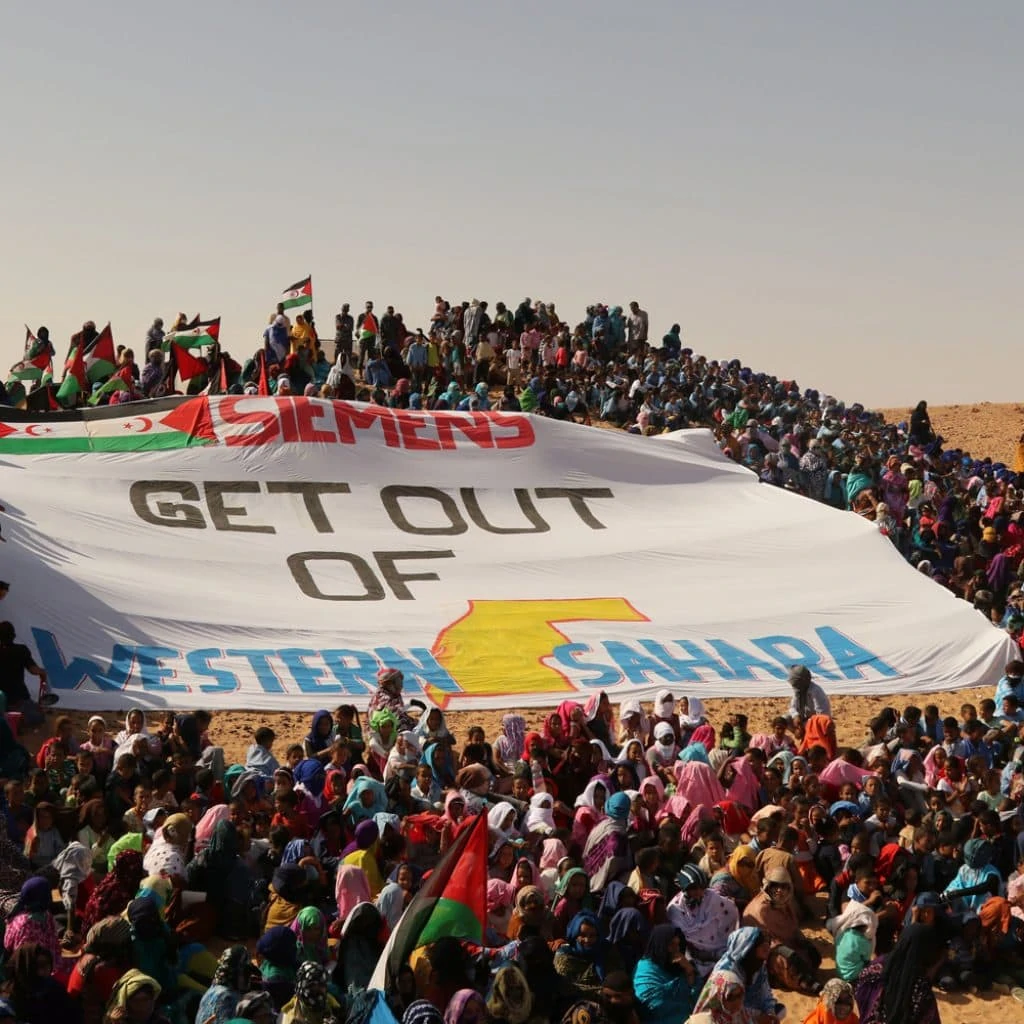Media Release
UN Climate Change Conference 2016 in Marrakech: Morocco cements the human rights violating occupation of Western Sahara with dirty deals for allegedly clean energy. Siemens wind turbines disrupt the UN peace process in the Western Sahara conflict. A detailed report highlights the unclean linkages.
On the occasion of the World Climate Conference in Marrakech (7 to 18 November 2016), Western Sahara Resource Watch (WSRW) and terre des hommes schweiz criticise the Moroccan programme for the expansion of renewable energies as an obstacle to the UN peace process in the Western Sahara conflict. Morocco is involved in the renewable energy sector. However, most of the wind farms promoted at the climate summit are not built in Morocco but in Western Sahara. Western Sahara has been under the illegal occupation of Morocco since 1975. More than half of the population fled at the time, and some 165,000 Sahrawis still have to stay in refugee camps in neighbouring Algeria. In addition, wind energy generated in the Western Sahara provides 95 percent of the electricity for the ecologically highly controversial phosphate mining in this region.
Critics serve life sentences
Siemens, together with the Italian company Enel, is most involved in the construction of wind energy projects in the Western Sahara. "With dirty deals for allegedly clean electricity, Siemens is cementing causes of flight," criticizes terre des hommes switzerland campaign coordinator Sylvia Valentin. Critics of the royal family's exploitation of raw materials in the occupied territory are serving life sentences in Morocco's prisons.
Close partnership with the royal family
Siemens and Enel win Morocco's tenders thanks to their partnership with the energy company owned by the Moroccan king. "The conclusion of major energy contracts with the Moroccan royal family has a high price for the UN peace process in Western Sahara. As long as the Moroccan king himself benefits from the illegal presence of the Moroccan army, he will continue to subordinate UN efforts to resolve the conflict in Western Sahara," says Erik Hagen of Western Sahara Resource Watch.
Siemens involved in violations of international law
The Siemens project in Foum El Qued has been particularly criticized. There, 22 wind turbines supply the electricity for the extraction of phosphate and its transport to the port via a 100-kilometer-long conveyor belt. The export of products from the Western Sahara is generally seen as a violation of international law. The people of the region have the right to manage their own resources. "A single shipload of phosphate can be worth more than a third of the total annual humanitarian aid for the refugees from Western Sahara. They are actually the rightful owners of the raw materials," explains Sylvia Valentin.
One quarter in illegally occupied territory by 2020
The WSRW report "Windy Business - What Morocco and Siemens are trying to hide at the COP22 climate conference in Marrakech" (download below), published in time for the climate summit, describes Morocco's plans to double its national wind power production by 2020 by adding an additional 1000 megawatts. 40 percent of the additional capacity is to be developed in the occupied territories. The controversial energy production from sun and wind in Western Sahara already accounts for almost seven percent of Morocco's total energy production. By 2020, this share could rise to more than 25 percent.
Green energy helps to override human rights
Western Sahara Resource Watch calls on all companies involved to stop their infrastructure projects in Western Sahara that are linked to the Moroccan government, so as not to impede the UN peace process. It should also be made clear that climate-friendly green energy must not override human rights. "Clean energy must also be produced with clean methods - legally, technically and morally", Erik Hagen demanded.
Contact:
Sylvia Valentin, campaign coordinator terre des hommes switzerland
+ 41 (0)61 338 91 45 (direct telephone)
sylvia.valentin(at)terredeshommes.ch


